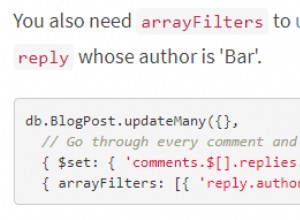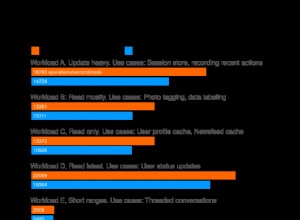पहला npm i mongodb क्योंकि आपको किसी भी आईडी को new ObjectID(idStr) . के साथ लपेटना होगा ।
तब आप यह कर सकते हैं:
const collection = Pet.getDatastore().manager.collection(Pet.tableName);
const res = await collection.find({ name: { $regex: /blue/ } });
const dataWithObjectIds = await res.toArray();
const dataWithIds = JSON.parse(JSON.stringify(rawDataArr).replace(/"_id"/g, '"id"'));
यह सब हमारे लिए करने के लिए मैंने एक हेल्पर फंक्शन बनाया है:
/**
* Use by chaining as if you were acting on a collection. So can use .find .aggregate etc.
* Returns json searializable data.
*
* @param {class} model A model
* @param {number} cnt - Number of chains on this, so I know when it reached the end
*/
function nativeMongoQuery(model, cnt) {
const collection = model.getDatastore().manager.collection(model.tableName);
let callCnt = 0;
let req;
const proxy = new Proxy({}, {
get: (_, method) => (...args) => {
if (!req) req = collection[method](...args);
else req = req[method](...args);
callCnt++;
if (callCnt === cnt) {
return (async function() {
const rawDataArr = await req.toArray();
return JSON.parse(JSON.stringify(rawDataArr).replace(/"_id"/g, '"id"'));
})();
} else {
return proxy;
}
}
});
return proxy;
}
module.exports = nativeMongoQuery;
मुझे JSON पार्स और स्ट्रिंग और ग्लोबल रिप्लेस पसंद नहीं है। लेकिन अगर मैं स्ट्रिंग नहीं करता, तो mongo _id सभी ObjectId हैं स.
इसे इस तरह इस्तेमाल करें:
const { ObjectId } = require('mongodb');
function makeObjectId(id) {
return new ObjectId(id);
}
const ownerIds = ['5349b4ddd2781d08c09890f4', '5349b4ddd2781d08c09890f5']
const ownerObjectIds = ownerIds.map(makeObjectId);
await nativeMongoQuery(Pet, 2).find({ owner: { $in: ownerObjectIds } }).sort({ dueAt: 1 });
यहाँ एक और उदाहरण है:
const mostRecentlyCreatedPets = await nativeMongoQuery(Pet, 1).aggregate([
{ $match: { owner: { $in: ownerObjectIds } } },
{ $sort: { createdAt: -1 } },
{ $limit: 1 }
]);
cnt तर्क आपको बताता है कि आपने वहां कितनी चीजों को जंजीर से जकड़ लिया है।




